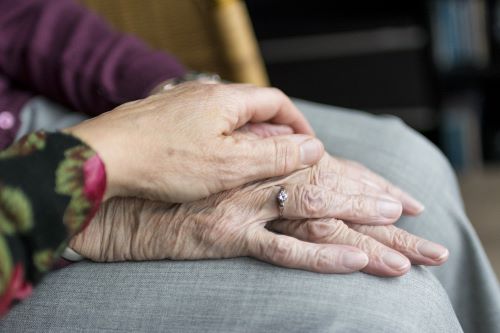Sharing lessons learned in care homes on coronavirus front line
 A study of the impact of coronavirus on people living and working in care homes pulls together lessons learnt during the first wave to help prepare for new outbreaks.
A study of the impact of coronavirus on people living and working in care homes pulls together lessons learnt during the first wave to help prepare for new outbreaks.Researchers from the University of Leeds worked with the National Care Forum to interview 35 care home and NHS staff and 11 sector managers at the height of the pandemic about their work on the front line.
The LESS COVID-19 study captures their experiences of how the disease presents and develops in older people; how care homes managed symptoms, outbreaks and end of life care, and successes in rehabilitation and recovery. It outlines what care home staff and managers can do to respond to future outbreaks.
Using their findings the researchers have issued a call to action to the government to recognise social care as an equal partner with the NHS in caring for some of the most vulnerable citizens in society.
The team calls on the government to urgently invest in the sector and provide better pay for workers; address testing delays and low testing capacity; provide reliable supplies of PPE at no cost to care homes, and promote rehabilitation and recovery for residents.
The researchers also call on the care home sector to carry on learning and sharing knowledge as well as celebrate and promote the expertise of staff and support their wellbeing and mental health.
Lead researcher Professor Karen Spilsbury, from Leeds’ School of Healthcare, said: “At a time when there was minimal, conflicting or irrelevant guidance for the sector, care home staff, organisations and bodies demonstrated responsiveness and maturity to promote and share learning during a crisis, with the sole purpose of benefiting the people living in care homes.
“These findings, however, also highlight the perception that care homes were abandoned at a time of crisis. It has also thrown into sharp relief issues that have long been known about, including lack of adequate funding, lack of integration across health systems and social care, and lack of understanding and value of the sector and its workforce.
“Further research is needed to explore public, professional and policy perceptions of the role and responsibility of the wider health and social care system to support older people living with frailty in care homes and to address the whole system changes needed to meet the needs of our ageing population.
“The Government must ensure the individual needs of older people are at the heart of policymaking – and take urgent action to invest in the care sector to enable better reward and recognition of the workforce.”
Liz Jones, Policy Director at the National Care Forum said: "This research is essential reading for all those involved in providing care for older people in this new world of COVID-19. It highlights the lessons learnt from the frontline of care at the height of the pandemic and offers some valuable insights and recommendations to help us respond effectively to future waves of COVID-19.
“This research was inspired by the daily conversations with our NCF members who were very eager to share their rapidly emerging learning and expertise in responding to COVID-19 in care settings. The practical ideas and actions suggested will help us to find better ways to manage the virus to inform our future response in subsequent waves.
“We hope that this research will be of value to both care homes that have already experienced COVID-19 and those that have not yet experienced an outbreak of the virus.
“Many of the suggestions in this research involve actions that can be grasped by the sector; however, there are levers and actions needed that are beyond the control of the sector and need support and action from government. These include resolving the ongoing testing and PPE supply uncertainties; working in genuine partnership with the sector and putting the individual needs of older people at the heart of policymaking.”
Susan Kay, Director, Dunhill Medical Trust said: “We’ve all been impacted by the COVID crisis - but older adults have been most severely affected. Capturing lessons learnt about the symptoms, progression and management of this viral infection in the older population and sharing these with care homes that have not yet experienced an outbreak of the virus is crucial. We have been pleased to be able to support this rapid review of the evidence and hope that its recommendations can really make a difference.
Further information
Picture: File image of hands (credit: sabinevanerp/Pixabay)
LESS COVID-19. Learning by Experience and Supporting the Care Home Sector during the COVID-19 pandemic: Key lessons learnt, so far, by frontline care home and NHS staff was funded by Dunhill Medical Trust. The report can be accessed here https://niche.leeds.ac.uk/news/
The University of Leeds is one of the largest higher education institutions in the UK, with more than 38,000 students from more than 150 different countries, and a member of the Russell Group of research-intensive universities. The University plays a significant role in the Turing, Rosalind Franklin and Royce Institutes.
We are a top ten university for research and impact power in the UK, according to the 2014 Research Excellence Framework, and are in the top 100 of the QS World University Rankings 2021.
The University was awarded a Gold rating by the Government’s Teaching Excellence Framework in 2017, recognising its ‘consistently outstanding’ teaching and learning provision. Twenty-six of our academics have been awarded National Teaching Fellowships – more than any other institution in England, Northern Ireland and Wales – reflecting the excellence of our teaching. www.leeds.ac.uk
Follow University of Leeds or tag us in to coverage: Twitter Facebook LinkedIn Instagram
More information about care home research conducted in partnership between the University of Leeds and Leeds Care Association is available at https://niche.leeds.ac.uk/. @SpillersK @Leeds_Niche
The National Care Forum brings together 120 of the UK’s leading social care charities, representing large numbers of care providers, offering thousands of services across the country, which are not for profit and always at the heart of community provision. Collectively, these charities deliver more than £1.9 billion of social care support to more than 135,000 people in 6500 settings. The NCF membership body collectively employs more than 85,000 colleagues.
For enquiries, please contact Lauren Ballinger (L.Ballinger@leeds.ac.uk).
























